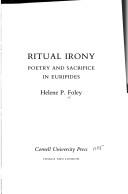| Listing 1 - 2 of 2 |
Sort by
|

ISBN: 0801416922 1501740644 1501740636 Year: 2019 Publisher: Cornell University Press
Abstract | Keywords | Export | Availability | Bookmark
 Loading...
Loading...Choose an application
- Reference Manager
- EndNote
- RefWorks (Direct export to RefWorks)
Ritual Irony is a critical study of four problematic later plays of Euripides: the Iphigenia in Aulis, the Phoenissae, the Heracles, and the Bacchae.Examining Euripides' representation of sacrificial ritual against the background of late fifth-century Athens, Helene P. Foley shows that each of these plays confronts directly the difficulty of making an archaic poetic tradition relevant to a democratic society. She explores the important mediating role played by choral poetry and ritual in the plays, asserting that Euripides' sacrificial metaphors and ritual performances link an anachronistic mythic ideal with a world dominated by "chance" or an incomprehensible divinity. Foley utilizes the ideas and methodology of contemporary literary theory and symbolic anthropology, addressing issues central to the emerging dialogue between the two fields. Her conclusions have important implications for the study of Greek tragedy as a whole and for our understanding of Euripides' tragic irony, his conception of religion, and the role of his choral odes.Assuming no specialized knowledge, Ritual Irony is aimed at all readers of Euripidean tragedy. It will prove particularly valuable to students and scholars of classics, comparative literature, and symbolic anthropology.
Didactic drama, Greek --- Irony in literature --- Mythology, Greek, in literature --- Ritual in literature --- Sacrifice in literature --- Tragedy --- 875 EURIPIDES --- Drama --- Greek didactic drama --- Greek drama --- 875 EURIPIDES Griekse literatuur--EURIPIDES --- Griekse literatuur--EURIPIDES --- History and criticism --- Euripides --- Criticism and interpretation. --- Tragedy. --- Irony in literature. --- Ritual in literature. --- Sacrifice in literature. --- Mythology, Greek, in literature. --- History and criticism. --- Literary studies: ancient, classical & medieval
Book
ISBN: 9789081709156 Year: 2012 Publisher: Brooklyn, NY punctum books
Abstract | Keywords | Export | Availability | Bookmark
 Loading...
Loading...Choose an application
- Reference Manager
- EndNote
- RefWorks (Direct export to RefWorks)
Euripides wrote two plays called Hippolytus. In this, the second, he dramatized the tragic failure of perfection. This translation comes in two forms; the first presents a simulacrum of the text as it might have appeared in unprocessed form to a reader sometime shortly after Euripides’ death. The second processes the drama into the reduced but much more distinct form of modern print translations.
Classical texts --- Euripides --- Works --- Translations into English. --- Ėvripid --- Yūrībīdīs --- Euripide --- Euripedes --- Eŭripido --- Eurypides --- Euripidesu --- אוריפידס --- エウリーピデース --- Εὐριπίδης --- classical literature --- tragedy --- Europides --- experimental translation
| Listing 1 - 2 of 2 |
Sort by
|

 Search
Search Feedback
Feedback About
About Help
Help News
News